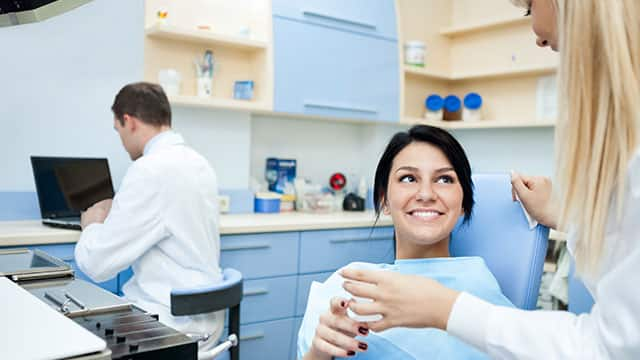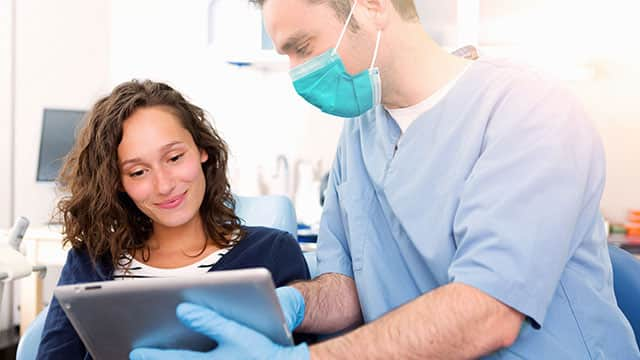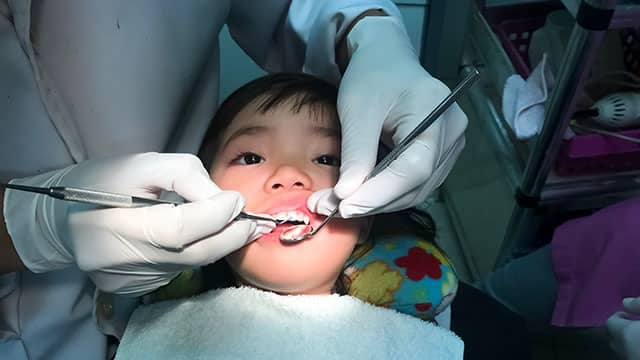Why Should You Visit The Dentist Before Cancer Treatment
There are many reasons to visit your dentist. But when cancer is at play, these three rise to the top.
- To Feel Better
- Make sure all your oral health concerns and issues are addressed. Healthy teeth and mouth will make your cancer treatment that much easier.
- To Save Teeth And Bones
- Your dentist can protect your teeth and bones when radiation and chemotherapy are in your treatment plan, according to the National Cancer Institute.
- To Continue Fighting
- The last thing you want with cancer is to hit pause during treatment because of an oral health concern. According to the American Dental Association, you should keep your dentist looped in or add them as a member of your cancer care team, so everyone is on the same wavelength regarding your medical and dental health.
How To Protect Your Mouth During Cancer Treatment
While visiting your dentist before cancer treatment, they'll share some helpful insight on how you can keep your oral health thriving throughout your journey.
- Brush Gently And Often
- Brush your teeth and tongue after every meal and before bedtime with an extra-soft toothbrush
- Floss Gently And Daily
- Remove plaque by flossing or using interdental brushes everywhere possible in your mouth daily, to keep areas between the teeth and at the gumline clean and healthy.
- Keep Your Mouth Moist
- Rinse and drink water often, use non-alcohol mouthwash, and use a saliva substitute as necessary
- Eat And Drink With Care
- Try to avoid overly spicy, sour, crunchy, and hard foods — as well as super hot, cold, and alcoholic drinks.
- Keep Trying To Quit
- If you are a tobacco user, lean on your cancer team to help you quit smoking or chewing tobacco.
What Are Some Tips for Mouth Problems
It's possible with cancer treatment that specific mouth issues arise. Here are some recommendations on what to do should they affect you. Contact your medical or dental team if they persist.
- Sore Mouth, Sore throat
- According to the National Cancer Institute, you should opt for easy to swallow food that are soft and wet, use a blender for easier swallowing, ask your doctor about pain medicine, avoid food and drink that can irritate your mouth, avoid alcohol, and tobacco products.
- According to the National Cancer Institute, you should opt for easy to swallow food that are soft and wet, use a blender for easier swallowing, ask your doctor about pain medicine, avoid food and drink that can irritate your mouth, avoid alcohol, and tobacco products.
- Dry Mouth
- Look into saliva substitutes with your dentist, use sugar-free candy or gum, and rinse with an over-the-counter dry mouth rinse recommended by your dentist.
- Infections
- According to Cancer.net, if there is any bleeding, swelling, or sores, you should avoid spicy, acidic, hard, and crunchy foods, and talk to your cancer care team about rinses or medicines to help manage the pain and treat the infection.
- Eating Problems
- Select foods that are easier for swallowing and seek your cancer team's aid on medicine that can numb sore mouth pain
- Bleeding
- Steer away from flossing where it's bleeding and sore while softening your toothbrush bristles in hot water
- Stiffness in Chewing Muscles
- Exercise and stretch three times a day by opening and closing your mouth 20 times as much as you can without pain
- Vomiting
- Brushing your teeth and gums with an ADA accepted fluoride toothpaste to eliminate the acid around the teeth and provide fresh breath.
- Cavities:
- Brush after every meal, before bed, and use a fluoride treatment as necessary to prevent cavities
When To Call Your Cancer Care Team About Mouth Problems
It will help if you become very intimate with checking your entire body, including your mouth, during cancer treatment. Don't hesitate to contact your cancer team if you notice:
- A mouth problem from the list above
- A prior issue becoming more concerning.
- Any other changes in your mouth you're not sure about
The only goal of your cancer treatment is to make sure you're healthy with a happy smile at the end of it. Your cancer care and dental team will provide the very best treatment and enlightenment during your journey of kicking cancer to the curb!
This article is intended to promote understanding of and knowledge about general oral health topics. It is not intended to be a substitute for professional advice, diagnosis or treatment. Always seek the advice of your dentist or other qualified healthcare provider with any questions you may have regarding a medical condition or treatment.
ORAL HEALTH QUIZ
What's behind your smile?
Take our Oral Health assessment to get the most from your oral care routine
ORAL HEALTH QUIZ
What's behind your smile?
Take our Oral Health assessment to get the most from your oral care routine















